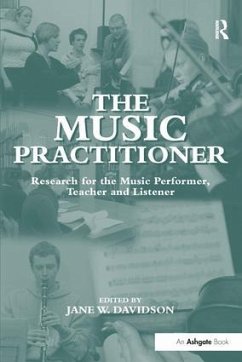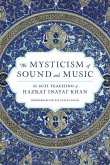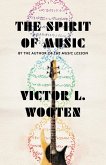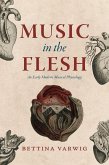The Music Practitioner
Research for the Music Performer, Teacher and Listener
Herausgeber: Davidson, Jane W
The Music Practitioner
Research for the Music Performer, Teacher and Listener
Herausgeber: Davidson, Jane W
- Gebundenes Buch
- Merkliste
- Auf die Merkliste
- Bewerten Bewerten
- Teilen
- Produkt teilen
- Produkterinnerung
- Produkterinnerung
This is the first book to provide a wide assessment of what ptactical benefits this research can bring to the music practitioner. With 25 chapters be writers representing a broad range of perspectives, this volume is able to highlight many of the potential links between music reserach and practice.
Andere Kunden interessierten sich auch für
![How Music Works How Music Works]() David ByrneHow Music Works23,99 €
David ByrneHow Music Works23,99 €![The Digital Musician The Digital Musician]() Andrew Hugill (UK Bath Spa University)The Digital Musician80,99 €
Andrew Hugill (UK Bath Spa University)The Digital Musician80,99 €![The Mysticism of Sound and Music: The Sufi Teaching of Hazrat Inayat Khan The Mysticism of Sound and Music: The Sufi Teaching of Hazrat Inayat Khan]() Hazrat Inayat KhanThe Mysticism of Sound and Music: The Sufi Teaching of Hazrat Inayat Khan34,99 €
Hazrat Inayat KhanThe Mysticism of Sound and Music: The Sufi Teaching of Hazrat Inayat Khan34,99 €![The Spirit of Music The Spirit of Music]() Victor L. WootenThe Spirit of Music21,99 €
Victor L. WootenThe Spirit of Music21,99 €![The Pleasure of Modernist Music The Pleasure of Modernist Music]() The Pleasure of Modernist Music41,99 €
The Pleasure of Modernist Music41,99 €![Music in the Flesh Music in the Flesh]() Bettina VarwigMusic in the Flesh52,99 €
Bettina VarwigMusic in the Flesh52,99 €![For the Love of Music For the Love of Music]() John MauceriFor the Love of Music18,99 €
John MauceriFor the Love of Music18,99 €-
-
-
This is the first book to provide a wide assessment of what ptactical benefits this research can bring to the music practitioner. With 25 chapters be writers representing a broad range of perspectives, this volume is able to highlight many of the potential links between music reserach and practice.
Hinweis: Dieser Artikel kann nur an eine deutsche Lieferadresse ausgeliefert werden.
Hinweis: Dieser Artikel kann nur an eine deutsche Lieferadresse ausgeliefert werden.
Produktdetails
- Produktdetails
- Verlag: Taylor & Francis Ltd
- Seitenzahl: 392
- Erscheinungstermin: 13. Juli 2004
- Englisch
- Abmessung: 234mm x 156mm x 22mm
- Gewicht: 732g
- ISBN-13: 9780754604655
- ISBN-10: 0754604659
- Artikelnr.: 57043575
- Herstellerkennzeichnung
- Libri GmbH
- Europaallee 1
- 36244 Bad Hersfeld
- gpsr@libri.de
- Verlag: Taylor & Francis Ltd
- Seitenzahl: 392
- Erscheinungstermin: 13. Juli 2004
- Englisch
- Abmessung: 234mm x 156mm x 22mm
- Gewicht: 732g
- ISBN-13: 9780754604655
- ISBN-10: 0754604659
- Artikelnr.: 57043575
- Herstellerkennzeichnung
- Libri GmbH
- Europaallee 1
- 36244 Bad Hersfeld
- gpsr@libri.de
Contents: Foreword; Introduction, Jane W. Davidson; Part 1 The Practitioner
and Research: Psychology and the music practitioner, Aaron Williamon and
Sam Thompson; What and why do we need to know about music psychology
research to improve music instrument teaching?, Kacper Miklaszewski; The
state of play in performance studies, John Rink; A case study of a
practical research environment: Sibelius Academy, Helsinki, Kari Kurkela.
Part 2 Theory and Experimentation: Understanding Pitches, Tuning and
Rhythms: From acoustics to psychology: pitch strength of sounds, Andrzej
Rakowski; 'Expressive intonation' in string performance: problems of
analysis and interpretation, Peter Johnson; Do compositions reveal
information about historical tuning?, Bernhard Billeter; Enrichment of
music theory pedagogy by computer-based repertoire analysis and
perceptual-cognitive theory, Richard Parncutt; The perceptual space between
and within musical rhythm categories, George Papadelis and George
Papanikolaou. Part 3 Practitioners Investigating their Daily Work: Making a
reflexive turn: practical music-making becomes conventional research, Jane
W. Davidson; Singing by heart: memorization strategies for the words and
music of songs, Jane Ginsborg; Formal and non-formal music learning amongst
rock musicians, Anna-Karin Gullberg and Sture Brÿndström; Priorities in
voice training: carrying power or tone quality, Allan Vurma and Jaan Ross.
Part 4 Researching Musician Identity and Perception: Rethinking voice
evaluation in singing, António G. Salgado; Assessing vocal performance,
Daniela Coimbra and Jane W. Davidson; Starting a music degree at
university, Stephanie E. Pitts; Tracing a musical life transition, Karen
Burland and Jane W. Davidson; Flawed expertise: exploring the need to
overcome the discrepancy between instrumental training and orchestral work
- the case of string players, Daina Langner. Part 5 Adopting Innovative
Research Approaches: A new method for analysing and representing singing,
Stefanie Sadler Elmer and Franz-Josef Elmer; The fears and joys of new
forms of investigation into teaching: student evaluation of instrumental
teaching, Ingrid Maria Hanken; A role for action research projects in
developing new pedagogical approaches to aural and musicianship education,
Nicholas Bannan; A new approach to pursuing the professional development of
recent graduates from German music academies: the alumni project, Heiner
Gembris; What music psychology is telling us about emotions and why it
can't yet tell us more: a need for empirical and theoretical innovation,
Matthew M. Lavy. Part 6 A Final Note: Musical chills and other delights of
music, Jerrold Levinson. Index.
and Research: Psychology and the music practitioner, Aaron Williamon and
Sam Thompson; What and why do we need to know about music psychology
research to improve music instrument teaching?, Kacper Miklaszewski; The
state of play in performance studies, John Rink; A case study of a
practical research environment: Sibelius Academy, Helsinki, Kari Kurkela.
Part 2 Theory and Experimentation: Understanding Pitches, Tuning and
Rhythms: From acoustics to psychology: pitch strength of sounds, Andrzej
Rakowski; 'Expressive intonation' in string performance: problems of
analysis and interpretation, Peter Johnson; Do compositions reveal
information about historical tuning?, Bernhard Billeter; Enrichment of
music theory pedagogy by computer-based repertoire analysis and
perceptual-cognitive theory, Richard Parncutt; The perceptual space between
and within musical rhythm categories, George Papadelis and George
Papanikolaou. Part 3 Practitioners Investigating their Daily Work: Making a
reflexive turn: practical music-making becomes conventional research, Jane
W. Davidson; Singing by heart: memorization strategies for the words and
music of songs, Jane Ginsborg; Formal and non-formal music learning amongst
rock musicians, Anna-Karin Gullberg and Sture Brÿndström; Priorities in
voice training: carrying power or tone quality, Allan Vurma and Jaan Ross.
Part 4 Researching Musician Identity and Perception: Rethinking voice
evaluation in singing, António G. Salgado; Assessing vocal performance,
Daniela Coimbra and Jane W. Davidson; Starting a music degree at
university, Stephanie E. Pitts; Tracing a musical life transition, Karen
Burland and Jane W. Davidson; Flawed expertise: exploring the need to
overcome the discrepancy between instrumental training and orchestral work
- the case of string players, Daina Langner. Part 5 Adopting Innovative
Research Approaches: A new method for analysing and representing singing,
Stefanie Sadler Elmer and Franz-Josef Elmer; The fears and joys of new
forms of investigation into teaching: student evaluation of instrumental
teaching, Ingrid Maria Hanken; A role for action research projects in
developing new pedagogical approaches to aural and musicianship education,
Nicholas Bannan; A new approach to pursuing the professional development of
recent graduates from German music academies: the alumni project, Heiner
Gembris; What music psychology is telling us about emotions and why it
can't yet tell us more: a need for empirical and theoretical innovation,
Matthew M. Lavy. Part 6 A Final Note: Musical chills and other delights of
music, Jerrold Levinson. Index.
Contents: Foreword; Introduction, Jane W. Davidson; Part 1 The Practitioner
and Research: Psychology and the music practitioner, Aaron Williamon and
Sam Thompson; What and why do we need to know about music psychology
research to improve music instrument teaching?, Kacper Miklaszewski; The
state of play in performance studies, John Rink; A case study of a
practical research environment: Sibelius Academy, Helsinki, Kari Kurkela.
Part 2 Theory and Experimentation: Understanding Pitches, Tuning and
Rhythms: From acoustics to psychology: pitch strength of sounds, Andrzej
Rakowski; 'Expressive intonation' in string performance: problems of
analysis and interpretation, Peter Johnson; Do compositions reveal
information about historical tuning?, Bernhard Billeter; Enrichment of
music theory pedagogy by computer-based repertoire analysis and
perceptual-cognitive theory, Richard Parncutt; The perceptual space between
and within musical rhythm categories, George Papadelis and George
Papanikolaou. Part 3 Practitioners Investigating their Daily Work: Making a
reflexive turn: practical music-making becomes conventional research, Jane
W. Davidson; Singing by heart: memorization strategies for the words and
music of songs, Jane Ginsborg; Formal and non-formal music learning amongst
rock musicians, Anna-Karin Gullberg and Sture Brÿndström; Priorities in
voice training: carrying power or tone quality, Allan Vurma and Jaan Ross.
Part 4 Researching Musician Identity and Perception: Rethinking voice
evaluation in singing, António G. Salgado; Assessing vocal performance,
Daniela Coimbra and Jane W. Davidson; Starting a music degree at
university, Stephanie E. Pitts; Tracing a musical life transition, Karen
Burland and Jane W. Davidson; Flawed expertise: exploring the need to
overcome the discrepancy between instrumental training and orchestral work
- the case of string players, Daina Langner. Part 5 Adopting Innovative
Research Approaches: A new method for analysing and representing singing,
Stefanie Sadler Elmer and Franz-Josef Elmer; The fears and joys of new
forms of investigation into teaching: student evaluation of instrumental
teaching, Ingrid Maria Hanken; A role for action research projects in
developing new pedagogical approaches to aural and musicianship education,
Nicholas Bannan; A new approach to pursuing the professional development of
recent graduates from German music academies: the alumni project, Heiner
Gembris; What music psychology is telling us about emotions and why it
can't yet tell us more: a need for empirical and theoretical innovation,
Matthew M. Lavy. Part 6 A Final Note: Musical chills and other delights of
music, Jerrold Levinson. Index.
and Research: Psychology and the music practitioner, Aaron Williamon and
Sam Thompson; What and why do we need to know about music psychology
research to improve music instrument teaching?, Kacper Miklaszewski; The
state of play in performance studies, John Rink; A case study of a
practical research environment: Sibelius Academy, Helsinki, Kari Kurkela.
Part 2 Theory and Experimentation: Understanding Pitches, Tuning and
Rhythms: From acoustics to psychology: pitch strength of sounds, Andrzej
Rakowski; 'Expressive intonation' in string performance: problems of
analysis and interpretation, Peter Johnson; Do compositions reveal
information about historical tuning?, Bernhard Billeter; Enrichment of
music theory pedagogy by computer-based repertoire analysis and
perceptual-cognitive theory, Richard Parncutt; The perceptual space between
and within musical rhythm categories, George Papadelis and George
Papanikolaou. Part 3 Practitioners Investigating their Daily Work: Making a
reflexive turn: practical music-making becomes conventional research, Jane
W. Davidson; Singing by heart: memorization strategies for the words and
music of songs, Jane Ginsborg; Formal and non-formal music learning amongst
rock musicians, Anna-Karin Gullberg and Sture Brÿndström; Priorities in
voice training: carrying power or tone quality, Allan Vurma and Jaan Ross.
Part 4 Researching Musician Identity and Perception: Rethinking voice
evaluation in singing, António G. Salgado; Assessing vocal performance,
Daniela Coimbra and Jane W. Davidson; Starting a music degree at
university, Stephanie E. Pitts; Tracing a musical life transition, Karen
Burland and Jane W. Davidson; Flawed expertise: exploring the need to
overcome the discrepancy between instrumental training and orchestral work
- the case of string players, Daina Langner. Part 5 Adopting Innovative
Research Approaches: A new method for analysing and representing singing,
Stefanie Sadler Elmer and Franz-Josef Elmer; The fears and joys of new
forms of investigation into teaching: student evaluation of instrumental
teaching, Ingrid Maria Hanken; A role for action research projects in
developing new pedagogical approaches to aural and musicianship education,
Nicholas Bannan; A new approach to pursuing the professional development of
recent graduates from German music academies: the alumni project, Heiner
Gembris; What music psychology is telling us about emotions and why it
can't yet tell us more: a need for empirical and theoretical innovation,
Matthew M. Lavy. Part 6 A Final Note: Musical chills and other delights of
music, Jerrold Levinson. Index.








